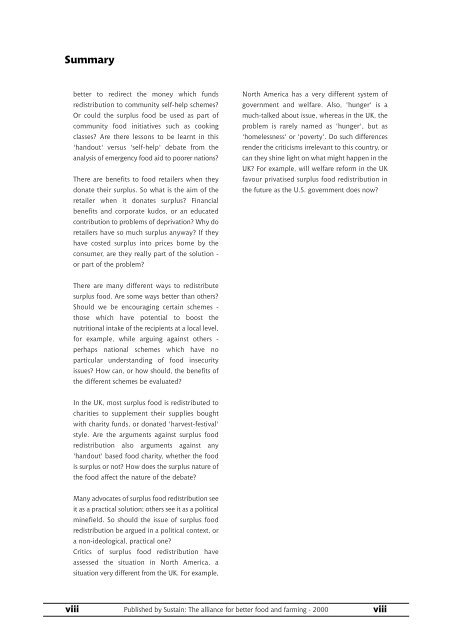Too much and too little? Debates on surplus food redistribution
Too much and too little? Debates on surplus food redistribution
Too much and too little? Debates on surplus food redistribution
Create successful ePaper yourself
Turn your PDF publications into a flip-book with our unique Google optimized e-Paper software.
Summary<br />
better to redirect the m<strong>on</strong>ey which funds<br />
redistributi<strong>on</strong> to community self-help schemes?<br />
Or could the <strong>surplus</strong> <strong>food</strong> be used as part of<br />
community <strong>food</strong> initiatives such as cooking<br />
classes? Are there less<strong>on</strong>s to be learnt in this<br />
'h<str<strong>on</strong>g>and</str<strong>on</strong>g>out' versus 'self-help' debate from the<br />
analysis of emergency <strong>food</strong> aid to poorer nati<strong>on</strong>s?<br />
l There are benefits to <strong>food</strong> retailers when they<br />
d<strong>on</strong>ate their <strong>surplus</strong>. So what is the aim of the<br />
retailer when it d<strong>on</strong>ates <strong>surplus</strong>? Financial<br />
benefits <str<strong>on</strong>g>and</str<strong>on</strong>g> corporate kudos, or an educated<br />
c<strong>on</strong>tributi<strong>on</strong> to problems of deprivati<strong>on</strong>? Why do<br />
retailers have so <str<strong>on</strong>g>much</str<strong>on</strong>g> <strong>surplus</strong> anyway? If they<br />
have costed <strong>surplus</strong> into prices borne by the<br />
c<strong>on</strong>sumer, are they really part of the soluti<strong>on</strong> -<br />
or part of the problem?<br />
l There are many different ways to redistribute<br />
<strong>surplus</strong> <strong>food</strong>. Are some ways better than others?<br />
Should we be encouraging certain schemes -<br />
those which have potential to boost the<br />
nutriti<strong>on</strong>al intake of the recipients at a local level,<br />
for example, while arguing against others -<br />
perhaps nati<strong>on</strong>al schemes which have no<br />
particular underst<str<strong>on</strong>g>and</str<strong>on</strong>g>ing of <strong>food</strong> insecurity<br />
issues? How can, or how should, the benefits of<br />
the different schemes be evaluated?<br />
l In the UK, most <strong>surplus</strong> <strong>food</strong> is redistributed to<br />
charities to supplement their supplies bought<br />
with charity funds, or d<strong>on</strong>ated 'harvest-festival'<br />
style. Are the arguments against <strong>surplus</strong> <strong>food</strong><br />
redistributi<strong>on</strong> also arguments against any<br />
'h<str<strong>on</strong>g>and</str<strong>on</strong>g>out' based <strong>food</strong> charity, whether the <strong>food</strong><br />
is <strong>surplus</strong> or not? How does the <strong>surplus</strong> nature of<br />
the <strong>food</strong> affect the nature of the debate?<br />
l Many advocates of <strong>surplus</strong> <strong>food</strong> redistributi<strong>on</strong> see<br />
it as a practical soluti<strong>on</strong>; others see it as a political<br />
minefield. So should the issue of <strong>surplus</strong> <strong>food</strong><br />
redistributi<strong>on</strong> be argued in a political c<strong>on</strong>text, or<br />
a n<strong>on</strong>-ideological, practical <strong>on</strong>e?<br />
l Critics of <strong>surplus</strong> <strong>food</strong> redistributi<strong>on</strong> have<br />
assessed the situati<strong>on</strong> in North America, a<br />
situati<strong>on</strong> very different from the UK. For example,<br />
North America has a very different system of<br />
government <str<strong>on</strong>g>and</str<strong>on</strong>g> welfare. Also, 'hunger' is a<br />
<str<strong>on</strong>g>much</str<strong>on</strong>g>-talked about issue, whereas in the UK, the<br />
problem is rarely named as 'hunger', but as<br />
'homelessness' or 'poverty'. Do such differences<br />
render the criticisms irrelevant to this country, or<br />
can they shine light <strong>on</strong> what might happen in the<br />
UK? For example, will welfare reform in the UK<br />
favour privatised <strong>surplus</strong> <strong>food</strong> redistributi<strong>on</strong> in<br />
the future as the U.S. government does now?<br />
viii Published by Sustain: The alliance for better <strong>food</strong> <str<strong>on</strong>g>and</str<strong>on</strong>g> farming - 2000 viii













